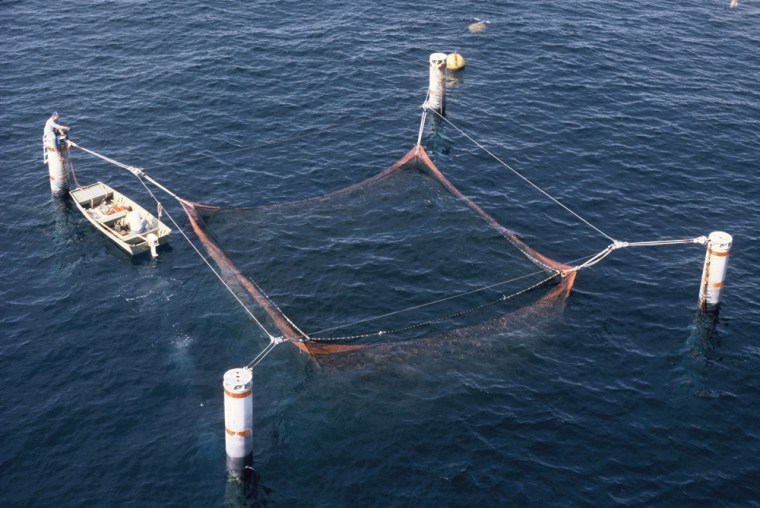The Gulf of Mexico is on the path to become the first ocean area in the United States where large-scale fish farms could sprout.
Next week, the Gulf of Mexico Fishery Management Council is expected to vote on whether to allow offshore aquaculture operations in federal waters. The council has shown an eagerness to permit the activity.
The vote will be a major step in a six-year-long debate among fishermen, scientists, environmentalists and business groups about the viability and dangers of offshore fish farming.
So far, fish farming has been limited to experiments close to shore. The Gulf council is proposing sweeping regulation that would open up waters far offshore.
Former President George W. Bush's administration pushed for opening U.S. waters to fish farming and succeeded in drawing support for the idea. Advocates say the United States has fallen behind other nations in the burgeoning field.
But environmentalists and fishermen have resisted, arguing that growing fish in large pens and cages in the open waters poses pollution risks and could harm wild stocks.
'Industrialization' feared
"If it passes, it will be a big step toward the industrialization of our open waters," said George Leonard, the director of The Ocean Conservancy's aquaculture program.
The Ocean Conservancy, a national group dedicated to conserving the oceans, is not opposed to offshore fish farming in principle, but says that national standards should be set before it is permitted.
"We need to treat this emerging industry comprehensively, and get it right the first time," Leonard said during a teleconference with reporters Thursday.
In U.S. waters, activities like fishing are governed in large part by eight regional councils like the one in the Gulf. The councils generally are made up of fishermen, fish industry executives, scientists and government officials.
Rick Leard, the Gulf council's deputy executive director, said the offshore aquaculture plan is a comprehensive set of regulations developed over six years of study.
The Bush administration had pushed forward with offshore fish farming after a 2005 energy bill gave the Minerals Management Service the power to develop alternative energy sources offshore, including fish farming.
But Leard said the status of that rule-making process was uncertain after President Barack Obama's administration halted Bush-era directives from moving forward without being vetted.
If the Gulf council passes the regulations, the Gulf would be a pioneer in open water fish farming. The Gulf council is expected to vote next week — either Wednesday or Thursday — at a meeting in Bay St. Louis, Miss.
Use retired oil platforms?
In the Gulf, there is interest in transforming unused offshore oil and natural gas platforms into fish farms. Some oil companies have already experimented with using the massive platforms to anchor underwater pens for raising fish. The platforms themselves could store feed and house farmers.
But critics say oil companies are looking for ways to avoid paying the steep costs of removing platforms no longer in use. It can cost millions of dollars to decommission a platform.
Yet, the idea of growing more fish is appealing and would offset the flood of imports, proponents say.
Experts in the Gulf estimate that it would take only 2,000 acres of fish farms to match the amount of fish caught every year in the wild.
Environmentalists counter that large-scale fish farming would pollute the oceans with fish waste and chemicals. Farmed fish, which often get heavy doses of antibiotics, can also escape into the wild and interfere with native species.
